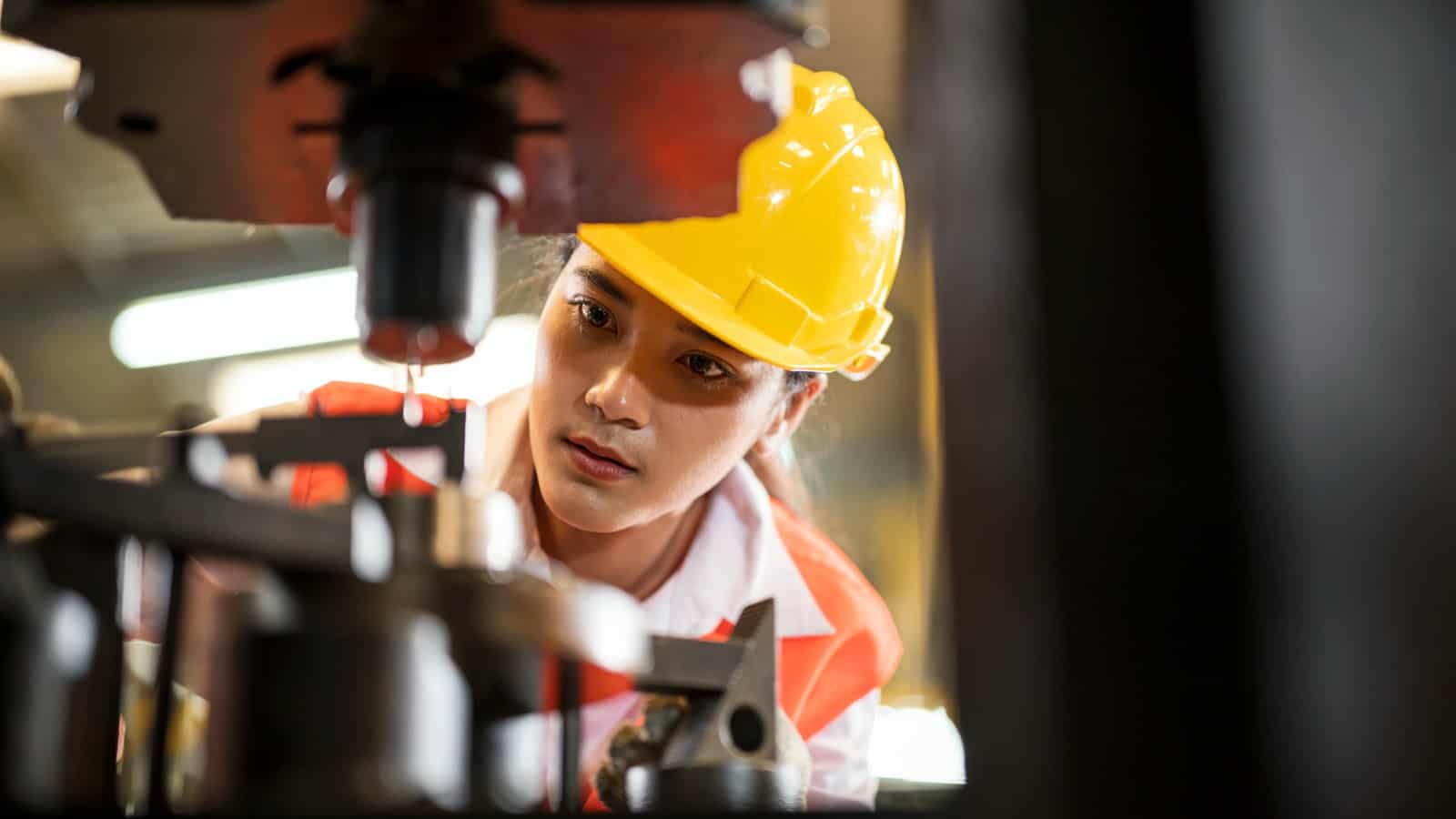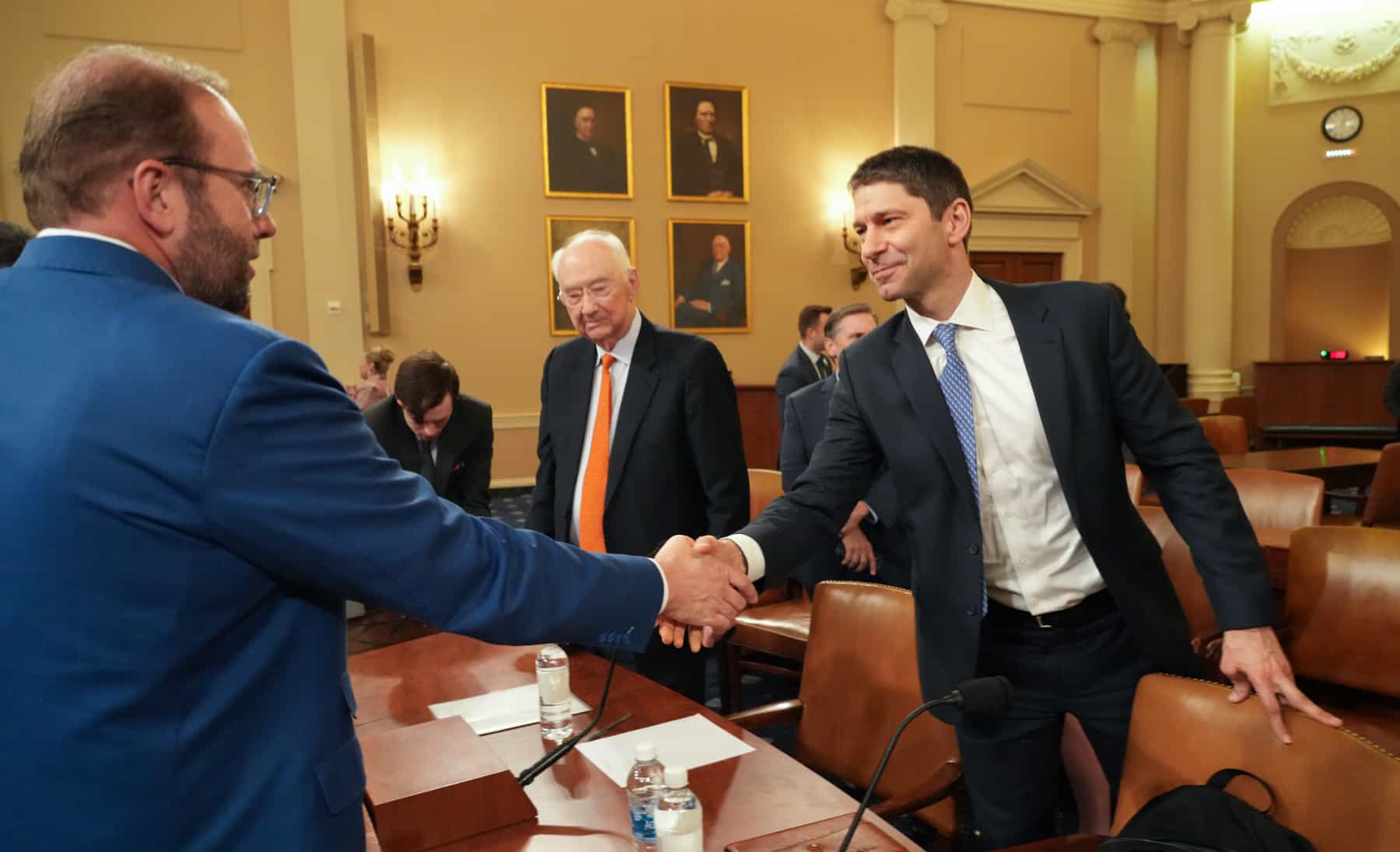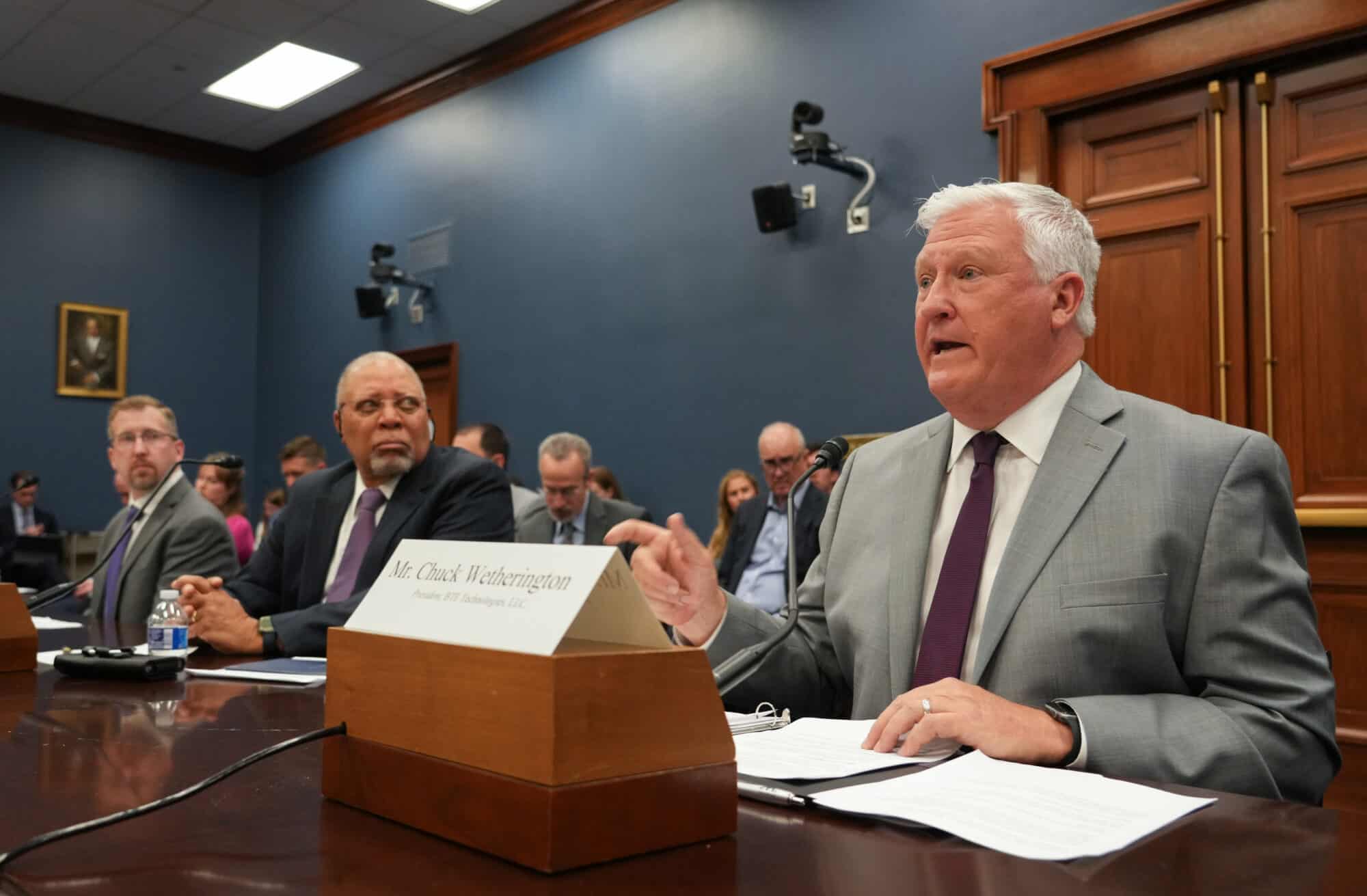EPA’s Power Plant Rule Is Unachievable Without Substantial Permitting Reform
America’s Energy Security Is Threatened
Washington, D.C. – Following the release of the Environmental Protection Agency’s new regulations on greenhouse gas emissions standards for certain power plants, National Association of Manufacturers President and CEO Jay Timmons released the following statement:
“Manufacturers appreciate the EPA removing existing gas plants from its new regulation, following manufacturers’ warnings about the initial proposal. However, the rest of the rule causes serious concern because Congress and the president have not enacted permitting reform—making it impossible to achieve the EPA’s highly aspirational mandates. We call on Congress to get serious by enacting significant and meaningful permitting reform this year. That is essential to ramping up the use of renewables, carbon capture, hydrogen and nuclear, for example, to meet future demand.
“The final rule threatens grid reliability because of the unrealistic timeline for power plants to adopt technologies within the next 10 years that have yet to even be proven at scale. Our nation should be doing everything possible to make sure our families, businesses and manufacturers have a modern, strong and reliable electrical grid, especially at a time when global turmoil threatens our energy security. This new rule does the opposite, creating a threat to our national and economic security that literally could leave Americans in the dark and factories offline. In short, the EPA is rolling the dice with Americans’ electricity and therefore with President Biden’s manufacturing legacy.
“Our industry has made transformational investments in these technologies and clean energy solutions, and we are leading the way in their deployment. The EPA should be partnering with us—not undermining this progress. We will continue to press the administration to achieve a more balanced regulatory framework to help reach our climate goals.”
-NAM-
The National Association of Manufacturers is the largest manufacturing association in the United States, representing small and large manufacturers in every industrial sector and in all 50 states. Manufacturing employs nearly 13 million men and women, contributes $2.89 trillion to the U.S. economy annually and accounts for 53% of private-sector research and development. The NAM is the powerful voice of the manufacturing community and the leading advocate for a policy agenda that helps manufacturers compete in the global economy and create jobs across the United States. For more information about the NAM or to follow us on Twitter and Facebook, please visit www.nam.org.
Noncompete Ban Would Disrupt Manufacturing in the U.S.

The Federal Trade Commission’s vote this week to prohibit noncompete agreements between employers and their employees threatens manufacturing in the U.S., the NAM said Tuesday.
What’s going on: In a 3–2 vote Tuesday, commissioners finalized a rule that, like a draft version circulated last year, “would deem practically any noncompete clauses for paid staff, independent contractors and unpaid workers to be an unfair method of competition rendered unenforceable, and [would require] employers to tell current and former employees they’ve stopped enforcing them” (Law360, subscription).
- The final rule is set to go into effect 120 days after it is published in the Federal Register, but lawsuits have been filed against it already, and additional legal action is expected.
What’s changed: One change made to the final rule following the receipt of more than 26,000 comments on it allows existing noncompete agreements with senior-level executives to remain in effect.
- Another difference between the rule’s prior iteration and the final is to the ban’s sole exception. The draft “permitted noncompetes for individuals selling their business or a substantial stake of at least 25%.” That threshold is not in the final version.
Why it’s problematic: The rule “is unprecedented and threatens manufacturers’ ability to attract and retain talent,” said NAM Managing Vice President of Policy Chris Netram.
- “In addition, [it] puts at risk the security of intellectual property and trade secrets—anathema to an industry that accounts for 53% of all private-sector R&D.”
- A noncompete ban would disrupt the majority of U.S. manufacturing operations, a 2023 NAM survey found.
What’s next: The NAM is considering all options in response to the final rule and is in active discussion with congressional leadership and the relevant committees of jurisdiction.
Proposed “Right-to-Repair” Exemptions Would Hurt Manufacturers, Consumers

The NAM testified before the U.S. Copyright Office last week, explaining how two proposed exemptions from copyright protections would weaken manufacturers’ intellectual property rights, do significant harm to their businesses and potentially endanger consumers.
What’s going on: The Copyright Office is considering whether to recommend two exemptions from the Digital Millennium Copyright Act that would allow users to circumvent measures protecting copyrighted content.
- One proposal was designed to allow the so-called “right-to-repair” by enabling access to operational data (including diagnostic and telematics data) from automobiles, agricultural vehicles, marine vessels and more. The other is focused on industrial equipment.
NAM speaks out: “The basis of the so-called ‘right-to-repair’ movement hinges on the false notion that owners do not have the ability to repair their own equipment,” NAM Vice President of Domestic Policy Charles Crain said at the recent hearing. “The truth, however, is that the majority of [original equipment manufacturers] already provide a wide range of resources and tools that allow users—and third-party repair businesses—to maintain, diagnose and repair products.”
- The NAM previously submitted comments urging the Copyright Office not to adopt the proposed exemptions.
Why it’s important: “These exemptions would undermine manufacturers’ IP rights in service of right-to-repair—and the record does not support their adoption,” Crain continued.
- The exemptions are too broad and inadequately defined, and their proponents have “failed to show that users will be adversely affected absent the ability to circumvent [copyright law].”
- What’s more, the exemptions “would expose proprietary information to public consumption and use, likely endangering consumers and allowing for unlawful modifications of government-mandated safety and emissions limits.”
The last word: “In short, right-to-repair is a solution in search of a problem,” Crain said.
Manufacturers: Bipartisan Vote Sends Powerful Message That Nation is Committed to Standing Strong in Defense of Democracy
Washington, D.C. – Following the House vote on the national security supplemental package, NAM President and CEO Jay Timmons released the following statement:
“Today’s bipartisan vote sends a powerful message that our nation is committed to standing strong in defense of democracy. Manufacturers thank Speaker Johnson for his leadership in shepherding these bills through the House at a critical juncture for our national security and for global stability.
“In March of 2022 at the onset of the Russian invasion, the NAM Board of Directors unanimously passed a resolution, ‘stand[ing] with the people of Ukraine in their fight to preserve freedom and independence.’ Last year, Ukrainian President Volodymyr Zelenskyy spoke to the NAM Board of Directors in an address to the American business community, and he underscored that ‘democracy is stronger than tyranny.’ Manufacturers share that conviction and will support those in Congress who recognize the importance of standing firm for our shared values.”
-NAM-
The National Association of Manufacturers is the largest manufacturing association in the United States, representing small and large manufacturers in every industrial sector and in all 50 states. Manufacturing employs nearly 13 million men and women, contributes $2.89 trillion to the U.S. economy annually and accounts for 53% of private-sector research and development. The NAM is the powerful voice of the manufacturing community and the leading advocate for a policy agenda that helps manufacturers compete in the global economy and create jobs across the United States. For more information about the NAM or to follow us on Twitter and Facebook, please visit www.nam.org.
Biden Calls for Tax Hikes in Hometown Speech

President Biden called for tax increases during a visit to his hometown of Scranton, Pennsylvania, on Tuesday, the Associated Press reports.
What’s going on: “Biden used Scranton, a city of roughly 75,000 people, as the backdrop to argue that getting rich in America is fine, but should come with heftier tax bills.”
What he said: President Biden—who has proposed a 25% minimum “billionaires tax”—used the bulk of his speech to call for tax hikes.
- “The president said decades of Republicans’ policies that cut taxes for the wealthy with the idea of stimulating the economy ‘failed America.’”
- President Biden has said raising taxes on the wealthiest Americans is “how we invest in the country.”
However … The Tax Cuts and Jobs Act of 2017 was “rocket fuel” for manufacturing, NAM President and CEO Jay Timmons said during his 2024 State of Manufacturing Address in February.
- In fact, as we discuss in another story in this edition of Input, the expiration of three pro-growth tax provisions from that law has harmed manufacturers throughout the U.S. And more tax hikes are scheduled to take effect at the end of 2025.
- It is critical to a healthy manufacturing industry and U.S. economy in general that expired, pro-growth provisions be reinstated—and that Congress act to forestall further tax increases next year.
The final say: “[T]he path is clear,” Timmons said in his February address. “No new taxes on manufacturers.”
Manufacturers Face Significant Cost Increases if Tax Bill Fails

U.S. manufacturers and other businesses are sharing the details of the potential economic fallout if Congress fails to pass NAM-supported, pro-growth tax legislation, The Wall Street Journal (subscription) reports.
What’s going on: “[L]arge public companies say the law as it stands is costing them hundreds of millions or billions of dollars, while some owners of small and medium-sized businesses say they wonder if their firms will survive.”
- The Tax Cuts and Jobs Act of 2017 allowed manufacturers across the U.S. to expand their businesses, hire and purchase new, much-needed equipment. But in 2022 and 2023, three critical provisions from the law—immediate expensing for domestic research and development, enhanced interest deductibility and full expensing—expired, hurting businesses of all sizes.
- In January, the House passed the Tax Relief for American Families and Workers Act, which would reinstate all three measures. The NAM has been pushing the Senate to pass the legislation, too.
Why it’s important: Lift truck and solutions manufacturer Hyster-Yale Materials Handling Inc. “spends around $100 million a year on R&D, and the law change that went into effect in 2022 increased its tax bill by about $25 million a year.”
- “So that’s $25 million less that I have to invest back into my business, whether it’s R&D, whether it’s plants and equipment [or] hiring new people,” Chief Financial Officer Scott Minder told the Journal.
- Other companies say the lack of action on the House-cleared tax bill “may prompt reduced investment in other areas and increase the rate of return required for new projects.”
Weighing a move: Hyster-Yale—which “spends around 80% of its research budget in the U.S.”—would like to keep its operations in the U.S., Minder continued, but it can’t guarantee that it will continue to do so without the return of the expired TCJA tax provisions.
- Other manufacturers are reporting a similar predicament.
The last word: “The stakes are clear: Congress must pass the Tax Relief for American Families and Workers Act or risk significant economic damage across the manufacturing sector,” said NAM Vice President of Domestic Policy Charles Crain.
- “Manufacturers are depending on Congress to restore these pro-growth tax policies, which support the investments in R&D and capital equipment that are so critical for manufacturing growth.”
NAM to White House: Stand Up for U.S. Businesses, Workers

The Office of the U.S. Trade Representative must revise its digital trade policy now to reassert American leadership, the NAM and more than 40 industry partners told the Biden administration ahead of U.S. Trade Representative Katherine Tai’s testimony this morning before the House Committee on Ways and Means.
What’s going on: In the past few years, the USTR has “retreat[ed] from digital trade protections,” the groups told National Security Adviser Jake Sullivan and National Economic Council Director Lael Brainard. Problematic actions/items by the USTR include:
- The October 2023 withdrawal of longstanding U.S. World Trade Organization positions that support the protection of cross-border data flows, stop data localization requirements, end discrimination against U.S. firms and their goods and services and protect sensitive data from bad actors;
- Abandonment of core U.S. policy priorities in the Indo-Pacific Economic Framework for Prosperity; and
- The omission in the USTR’s 2024 National Trade Estimate Report on Foreign Trade Barriers of numerous digital trade barriers, despite the statutory obligation under the Trade Act of 1974 to detail such barriers.
Why it’s important: These moves raise “deep economic and national security concerns,” the groups continued. They are in direct opposition to the interest of U.S. companies and their employees, and they give greater power to foreign nations, including China, “to write the rules that will govern the global digital economy for years to come.”
What must be done: The USTR must revise its stance on digital trade to “stand up for U.S. businesses and workers who face damaging digital trade barriers in foreign countries.”
Manufacturer to Congress: Support the American Dream

Austin Ramirez is living proof that the American dream still works—when the right policies are in place.
The president and CEO of family-owned Husco, a Waukesha, Wisconsin-based, hydraulic and electromechanical control systems manufacturer, told lawmakers Thursday that his family was able to found and expand a successful business in large part thanks to pro-growth tax policies.
All in the family: “My dad came to the states from Puerto Rico as a 6-year-old and grew up to earn a master’s in aerospace engineering and a Harvard M.B.A.,” Ramirez said at a hearing of the House Ways and Means Committee.
- “In short, our story is the embodiment of the American dream. But it was made possible by American reality—the laws that all of you write in this very room have a direct, concrete impact on our ability to succeed.”
Impact of expirations: The 2017 Tax Cuts and Jobs Act made it possible for manufacturers across the country to invest in new equipment, pay for renovations and expansions, hire much-needed workers and more. It was “unquestionably a success,” according to Ramirez.
- But the 2022 and 2023 expiration of three manufacturing-critical tax provisions in the legislation—immediate expensing for domestic research and development, enhanced interest deductibility and full expensing, which the NAM has been urging legislators to reinstate—has already hit Ramirez’s business, and hard.
- “Husco now has to amortize our R&D expenses, making it far more costly for us to design customized, proprietary products for our customers,” Ramirez went on. “Debt financing is now more expensive … [a]nd we can no longer immediately expense the full cost of our capital equipment purchases, forcing [us] to make smaller investments, spread out over many years.”
More tax increases coming: Ramirez also highlighted the TCJA provisions that are set to expire next year and the economic damage the expiration would cause.
- “At the end of 2025, individual tax rates will increase and individual tax brackets will decrease,” he said. “These changes mean that pass-through businesses like Husco will have more of our income subject to a higher rate of tax. At the same time, the pass-through deduction will expire completely, doubling down on the tax hikes that we face. … [A]llowing tax reform to sunset will undermine much of the progress we’ve made since 2017.”
What must happen: Ramirez thanked the committee for passing the Tax Relief for American Families and Workers Act—and reminded them of work still to be done.
- “Congress must act now to restore expired provisions—and be prepared to act in 2025 to forestall even more damaging tax increases. Only by preserving the Tax Cuts and Jobs Act can Congress ensure that uniquely America stories like Husco remain possible.”
Small Manufacturer: Industry Needs Tax Consistency

Small manufacturers need one thing from Congress, BTE Technologies President Chuck Wetherington told lawmakers on Wednesday: a consistent, pro-growth tax code.
What’s going on: Speaking at a hearing of the House Committee on Small Business, Wetherington told lawmakers how increased taxes and frequent changes to the tax code have harmed his company, a 40-employee medical device manufacturer in Hanover, Maryland.
- By passing the 2017 Tax Cuts and Jobs Act, “Congress was able to take a stale, outdated tax code and update key provisions to reduce taxes on small manufacturers,” Wetherington said. That legislation “drove a new wave of economic activity and industrial expansion. BTE, and many of our peers in the industry, experienced historic growth in the years between tax reform and the pandemic.”
- But the expiration in 2022 and 2023 of three crucial tax provisions—immediate expensing for domestic R&D, enhanced interest deductibility and full expensing, each of which the NAM is leading the charge to reinstate—is now hurting BTE and other businesses in its supply chain.
- And more tax hikes are on the horizon, with tax reform’s small business incentives—including the 20% pass-through deduction—set to expire at the end of 2025.
Less capital, fewer projects: “Bringing a medical device to market is extremely risky and takes years and millions of dollars of investment,” Wetherington continued. “But now, BTE cannot immediately expense those costs—reducing the working capital I have available to invest in my business and my employees … [and] delay[ing] projects to redesign and improve BTE’s flagship products.”
- As a direct result of the changes, BTE has had to put off expansions that would have allowed it to expand its workforce by 50%.
- And because most of BTE’s suppliers are pass-through businesses (entities in which profits pass through to the owner and are taxed at the individual rate), BTE will see even higher operating costs at the end of 2025, when tax rates are scheduled to increase and the pass-through deduction is set to expire.
What must be done—now: The Senate must pass the House-passed Tax Relief for American Families and Workers Act, which would reinstate the three expired provisions that are so critical to manufacturers. And Congress must commit to preventing the economic damage from the scheduled tax increases.
- “We deserve a tax code that promotes innovation and demonstrates to the rest of the world what our values will be for the next decade and beyond,” Wetherington said.
TSMC to Receive Up to $6.6 Billion in CHIPS Funding

The Biden administration on Monday announced that TSMC’s Arizona subsidiary will receive up to $6.6 billion in grants from the 2022 CHIPS and Science Act, The New York Times reports. The announcement is the latest move by the Biden administration to make the United States a leading producer of cutting-edge semiconductor technology.
What’s going on: The funding “will help support the construction of TSMC’s first major U.S. hub, in Phoenix. The company has already committed to building two plants at the site and will use some of the grant money to build a third factory in Phoenix, U.S. officials said on Sunday.”
- The company will “increase its total investments in the United States to more than $65 billion, up from $40 billion.”
- “TSMC’s investment is expected to create about 6,000 direct manufacturing jobs and more than 20,000 construction jobs, federal officials said.”
- In addition to the grants, the federal government is also offering TSMC up to $5 billion in loans.
Impact on U.S. chip production: “With projects such as TSMC’s, the U.S. is on track to make about 20% of the world’s cutting-edge chips by 2030, the Commerce Department said. It called the project the largest foreign direct investment in a new project in U.S. history,” reports The Wall Street Journal (subscription).
- Earlier this year, the Biden administration announced major chips funding awards for Intel and GlobalFoundries.
The NAM’s reaction: “Today’s announcement from TSMC and @CommerceGov makes America stronger,” the NAM wrote in a social post Monday. “The NAM-championed CHIPS and Science Act continues to spur new investments in cutting-edge semiconductor technology that is essential to advancing U.S. economic competitiveness.”
